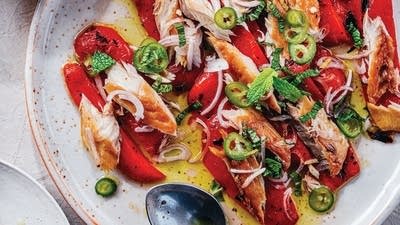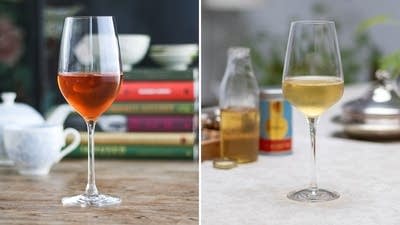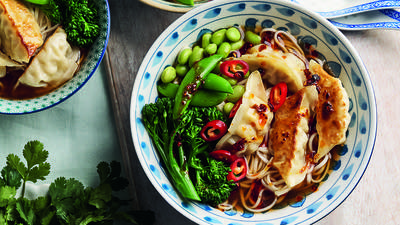
In our modern times, thanks to the internet always at our fingertips hosting an endless array of food columns and blogs, and cable network food channels profiling the last rock star chefs and trending cuisine, it’s hard to imagine a time when home chefs did not have access to all the recipes, cooking science, and food media they could ever care to digest. But back in the 1950s and 1960s, you’d mainly find food in newspapers in a section called, pointedly, the “women’s pages.” Hanna Raskin, food editor of Charleston’s The Post and Courier looked into the history of the women’s pages as part of a larger story for the Southern Foodways Alliance. She found a rich history and a few of the fascinating women who edited them.
One quick note: the header image on this page shows a group of woman working on food section pages for the Miami Herald, considered the best in the country in the 1950s and 1960s. The photo on the left includes Roberta Applegate, Dorothy Jurney, Marie Anderson, and Jeanne Voltz. On the right, you see Jeanne Voltz getting a preview of a dish directly from the chef. These photos were provided by Kim Voss from her Women's Page History project (more below) via Jeanne Voltz's daughter, also named Jeanne Voltz.
Francis Lam: Can you tell us what the women’s pages were and how they started?
Hanna Raskin: A lot of people got the women's pages wrong because a lot of people didn't read them. And by “a lot of people,” I mean “men.” That granted a measure of freedom to the women who edited and wrote for these pages that they exercised and enjoyed. There were corporate recipes that showed up on those pages; there were also plenty of reader-submitted recipes and recipes from the food editor herself. But you often had a lot of Q&A format, and in that space, where women who were cooking or taking care of their home would ask for help, oftentimes, these would become somewhat political discussions. Sometimes they needed help with figuring out how to find daycare for their kids. Sometimes they needed help with transportation to the supermarket. These political issues filtered into what was supposedly a page about food.
 Journalist and Miami Herald food editor Lowis Carlton leads a group discussion at the newspaper offices in the 1970s. Carlton had a background in both journalism and home economics. She also wrote several Florida cookbooks.
Photo: Kim Voss/Women's Page History
Journalist and Miami Herald food editor Lowis Carlton leads a group discussion at the newspaper offices in the 1970s. Carlton had a background in both journalism and home economics. She also wrote several Florida cookbooks.
Photo: Kim Voss/Women's Page History
FL: What do you mean by saying they were political issues?
HR: There was plenty of discussion of food stamps and school lunch, issues as to how the government should or should not support farmers, things that were probably being covered elsewhere, but here they were being covered through the lens of food.
FL: You looked into the stories of some of these editors who were doing really interesting stuff.
HR: Absolutely. I do want to credit Kim Voss, an academic who started pulling some of these names from the archives and finding some of their work. What brings them together is what unifies food writers today: they had tremendous curiosity, they were very courageous, and that courage sometimes came into play in their own workplaces. They had to deal with what was, essentially, a gender-segregated workplace in many cases. They would be sent to rooms sometimes on different floors, so that they wouldn't be exposed to the cigar smoke and curse words that personified newsrooms at that time. In a lot of cases, they never got married, either because they were independent and chose not to, or some of them have since said – or did say – the job didn't allow them to. These women were devoted to their work.
The first woman I got a chance to familiarize myself with was Charlotte Walker, the woman who held the position I now hold, which is Food Editor at what is now The Post and Courier. It was a different paper at the time. She was very typical of these women in that she was born in Canada and started in journalism at a young age and loved it. She was very excited by the whole prospect of breaking news and communicating with an audience. But her marriage didn't go well and she wanted a divorce, which at the time in Canada literally required an act of Parliament. She moved to Reno, it gave her a quickie divorce. She met someone there who suggested Charleston – it’ not clear if she also suggested the man who would eventually become Charlotte Walker's husband. In Charleston, she became food editor at the paper and flourished. She did a wonderful job, never gave up the Canadian tradition of drinking scotch and ginger ale, loved stories, and kept that food page going for decades.
FL: You also looked into a woman named Eleanor Lee.
HR: I came to know Eleanor Lee when I was doing research into this chef's tournament that was held in Virginia in the late 1940s. She was considered, then, a very authoritative panelist. They had sought her out to lend some expertise to this competition. Eleanor Lee had a radio show first, and then ended up becoming the food editor for The Washington Post. She was a trailblazer in some of the political stuff. She, like many of her counterparts, did a fantastic job of making women feel okay about making choices: making choices in the kitchen, making choices to not be in the kitchen. We look back at a lot of these 1950s women's pages and we see a lot discussion of shortcuts and mixes, things that now seem so at odds with where we are in the fresh, local, seasonal food movement. It's important to remember that those were the technical advances that gave these women an opportunity to spend a little less time in the kitchen. And when the food editors got behind them, they were getting behind their fellow women.
FL: It sounds like they were these super self-empowered women practicing this kind of proto-feminism.
HR: They absolutely were. Unfortunately, what happened then is, in the 1970s, when feminism becomes a big movement, some of its leaders did not appreciate all that these women had done and associated them with keeping women tied to the kitchen. If you go through these older food sections, you absolutely see things about pleasing your husband, that is a trope that occurs and recurs. In response to that, a lot of the younger feminist activists did not want anything to do with these women. These women who had been rejected by their newsrooms and by their coworkers for years, although beloved by their audiences – they were the confidantes for their communities –they had a tough time in the workplace, and weren't any more appreciated by these younger women for what they had done.
Our conversation with Hanna Raskin was inspired by a piece that she wrote in the Spring 2017 issue of Southern Foodways Alliance's quarterly Gravy and a presentation she gave at the group's Food Media South event in Februrary 2017. You can also learn more about the history of the women's pages and research by Kim Voss (University of Central Florida) by visiting her Women's Page History website.
Before you go...
Each week, The Splendid Table brings you stories that expand your world view, inspire you to try something new, and show how food connects us all. We rely on your generous support. For as little as $5 a month, you can have a lasting impact on The Splendid Table. And, when you donate, you’ll join a community of like-minded individuals who love good food, good conversation, and kitchen companionship. Show your love for The Splendid Table with a gift today.
Thank you for your support.
Donate today for as little as $5.00 a month. Your gift only takes a few minutes and has a lasting impact on The Splendid Table and you'll be welcomed into The Splendid Table Co-op.




